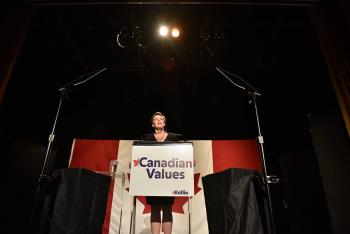While details are still unfolding on the Quebec City mosque attack Sunday night, there is little question that the shooter was motivated by hate for Muslims. As such, Quebec and Canadian political leaders should take a long, hard look at how their statements and actions may exacerbate such hate.
Quebec Muslims rightly see the Quebec City mosque killings as just the latest escalation in a trend of growing harassment against Canada's Muslims. "The Muslim community in Quebec is suffering from a flood of hate attacks...and now the attacks are escalating and bringing...the death of innocent people," lamented Samer Majzoub, president of the Canadian Muslim Forum.
It may be months before we learn the twisted motives of the killer in the mosque attack, but it is certainly not unreasonable to suppose that U.S. president Donald Trump's Muslim travel ban might have played a role in encouraging the attack. Because whether they come from Trump or anyone else, the statements and actions of our political leaders can easily legitimize unacceptable attitudes or behaviour in society.
It is the demagogues of our time who may be particularly to blame. MP Kellie Leitch is one apt example that comes to mind. In 2015, Leitch was the front-woman for the Harper government's "barbaric practices tip line," which falsely but implicitly suggested that Canadian Muslims maintain practices which are already illegal under Canadian law, like forced marriages and honour killings. Now as a Conservative leadership candidate, Leitch has upped the ante in her anti-Muslim rhetoric by calling for the screening of "immigrants, refugees, and visitors" for "anti-Canadian values."
Leitch was part of a Harper government which stoked anti-Muslim sentiment for years. For example, Harper consistently played off the danger of extremist Islamic terror, stating in 2011 that "Islamicism" was the biggest threat facing Canada. As one critic put it at the time, "Harper never loses a chance to invoke the spectre of Islamist terrorism."
One high visibility manifestation of Harper's anti-Muslim bias was his decision to block Muslim refugees from receiving asylum in Canada. Another was his attempt to prevent Muslim women from wearing the niqab during citizenship ceremonies – a case which he lost, but which dragged publicly through the courts for months. After seeing Harper repeatedly lose this case in the courts, one commentator authored a piece, "Call the niqab issue what it is -- a shameless play for the bigot vote."
In Quebec, the Parti Quebecois government of Pauline Marois proposed an infamous law in 2013 known as the "Charter of Values" which had a deep anti-Muslim focus. This bill, proposing the banning of many religious symbols – such as the hijab – in the public service, severely exacerbated anti-Muslim currents in the province. Quebecers experienced déjà vu this past fall when conservative Quebec politician François Legault resurrected some of the very same issues relating to Muslim dress.
Many of Canada's Muslims have fled to Canada as witnesses of violence, oppression and terrorism themselves. It is therefore ironic that they are now targeted by conservative politicians in Canada somehow as a "source" of extremism. In fact, given their first-hand experience with oppression and violence, they are often the most ardent defenders of the liberties that many Canadians take for granted. Indeed, Majzoub concludes his statement on the attack by stating, "This massacre does not represent the values of Quebecers and Canadians, [like those] of peace, equality and freedom of belief."
Gestures and words on the part of our politicians do matter. We may never know what drove the attacker to murder six people praying in their Quebec City mosque this past weekend. However, we can be certain that fear-mongering language from our politicians can only be dangerous and counterproductive to a healthy and unified Canadian society.
Like this article? Please chip in to keep stories like these coming.
Image: Facebook/Kellie Leitch




Comments
Do
Don't